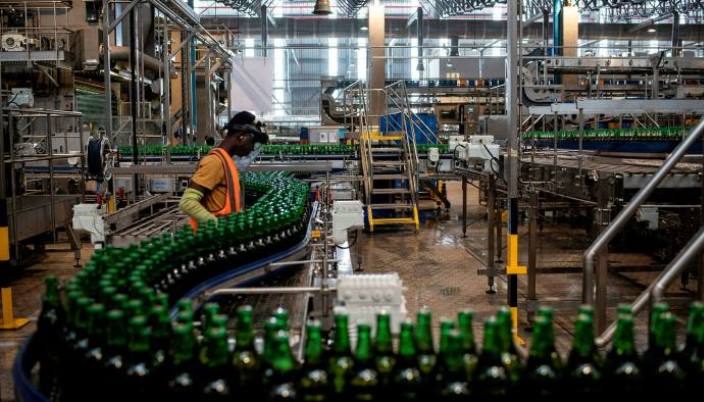Nigeria’s packaging market is expected to nearly double within five years, lifted by rising demand across food, beverage and e-commerce sectors. Yet for all the promise, automation adoption remains limited, an opportunity gap that foreign manufacturers are eager to fill.
The energy at Propak West Africa in Lagos made that clear. Machine makers, some of whom were visiting for the first time, flew in from the world’s biggest economies to pitch their technology to buyers in Nigeria and West Africa,
Global brands such as German manufacturer of packaging and bottling machinery, Krones and Ivorian company SBA Group, with local offshoots in the country, joined the hustle, each vying to persuade manufacturers that their machines could enhance their competitiveness in a fast-growing market.
Ayodele Abioye, managing director of BUA Foods, in a presentation, said that the global packaging market is expected to reach $1.42 trillion by 2028 and 2032 from $1.17 trillion in 2023/24, according to market intelligence company, Smithers.
For Nigeria, the figures multiply from $1.94 billion in 2023 and 2024 to $3.54 billion by 2030.
“Demand is very strong. The population is rising,” said Anthony Osunde, who oversees sales at Krones.
“Nigeria will have 400 million people by 2050. You have to keep up. As the population is rising, there’s no way you won’t need more heads to drink. That’s a big driver for our business.”
In terms of growth, the Africa-wide packaging market is projected to grow at a Compound Annual Growth Rate (CAGR) of around 3.85 percent to 4.63 percent between 2025 and 2030, according to modor intelligence.
And West Africa’s packaging sector is already expanding at 8 to 10 percent annually, driven by robust demand across key sectors, reported Jai Prakash, who runs ALL Time Packaging, supplying film rolls and wrappers for bakery products out of Ogun state.
He says automation could help Nigerian manufacturers cut costs, improve efficiency, and raise quality to international trade standards.
“Automation is no longer optional, it’s essential for global competition,” he said. “Globally, 70 percent of packaging manufacturing now use automation. Robotics, AI, IoT are becoming standard. This is our significant opportunity gap.”
Shortly after his speech, Prakash will be seen with an Indian machinery manufacturer, seeking to close a deal. The room was scattered with others like him, seeking to secure a piece of the shiny machinery that could improve productivity and raise their ratings in the market at the very least.
Rajendra Desai, head of projects at Jagmohan, exporters of packaging machines, flew in from India to market his equipment. He had already sold the $28,000 12-foot engine he was sitting beside, churning out plastic plates and keg covers, and was seeking to close more deals.
The machines on show came with daunting price tags in a country where initial investment in automation technologies remains a barrier for small and medium enterprises.
A basic pallet labeller, less than the height of the average human, used to imprint product details onto product packages, costs around N40 million, BusinessDay learned.
Larger packaging end-to-end lines manufacturing up to 100,000 bottles per hour can reach €12,000,000, according to Krones. The money savers will have to settle for the minimum capacity machines of 4,000 bottles per hour or purchasing single equipment, worth €200,000.
According to Adeboye Osunmadewa, sales engineer for SBA group, “It depends on the value you’re getting from it. It won’t come cheap, but it saves time, energy, and brand.” The company even tries to lure customers by offering payment in installments.
But affordability is only the first hurdle.
Read also: Sanwo-Olu wants manufacturers to embrace smart packaging
For those who can afford it, bringing it into the country is a hassle due to multiple layers of delays and taxes that could sometimes cost more than the machine itself, coupled with the naira’s poor valuation eroding profit.
“Imagine wanting to buy a small machine of $10,000 and clearing it for N15 million naira because it comes in a container. Who wants to do that? It doesn’t make economic sense,” said Mayowa Elefin, a mechanical engineer and importer.
He imported his first recycling machinery from a Chinese maker in 2020, when things were even smoother, he said. The $35,000 recycling line, an investment in his recycling business, spent 3 weeks at the port with a bill of up to N10 million in clearance costs.
Knowing the power situation, his machines run on diesel generators. At the time, he spent roughly N130 per litre on fuel, a price tag supported by subsidy.
But after it was removed by President Tinubu, fuel prices rocketed. Elefin could no longer sustain his business after operations cost tripled, forcing him to shut down production and sell off his machinery, a decision he now considers more profitable.
He told BusinessDay he now works as a reseller, taking commissions on imported parts, and riding on surging demand to make profit.
For those who can afford new machinery, installation and maintenance require imported expertise to cover skilled worker shortage. Most systems require specialist engineers to set up, and spare parts are rarely available locally.
Elefin says he’s expecting engineers from the Chinese company he patronised to install the new line. Krones, with a large presence in Nigeria, said it has about 200 Nigerians on the ground to support clients like Lacasera with up to 50,000 lines running simultaneously. But the ratio of local to foreign remains wide.
To surmount the finance and skill gap, manufacturers at Propak suggested innovative financing and “tailored leasing models for SMEs to reduce entry barriers.” This includes training programs to build a skilled workforce to meet surging demand and remain competitive, and stronger public-private partnerships to address the infrastructure gap.


